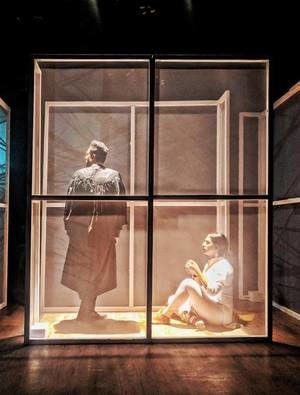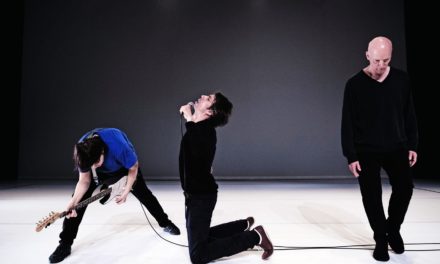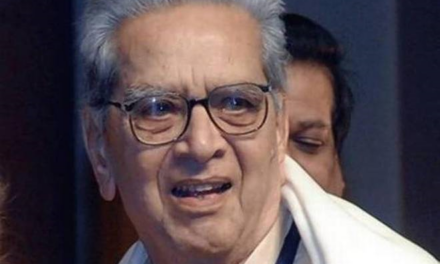In his play, Contempt, queer activist and lawyer Danish Sheikh draws parallels (or contrasts) between the contemporaneous Section 377 debate in India and a conference in ancient Greece, as detailed in Plato’s Symposium, where free-wheeling declamations over wine and ritual take place in praise of Eros, the winged god of sexual attraction. The philosophizing men at the banquet are supplanted by new stakeholders—latter-day queer individuals—even as faint echoes of their dexterous oratory can be heard in the modern forum of an Indian courthouse, where voices of the repressed are routinely stifled, and where the most rudimentary of arguments must pass for informed parley. In an interweaving of the personal and the political, Sheikh draws from both individual testimonials and actual transcripts of the courtroom deliberations that led to the controversial and still extant Supreme Court ruling of 2013 that upheld the constitutionality of the draconian law.
Underscored by rage
Currently running weekends at Delhi’s Oddbird Theatre and Foundation, the play’s first public reading was at Colombo’s British Council in 2017. In March, it traveled to London, as part of an international line-up of “queer plays” at the Arcola Theatre. The LGBT umbrella allows Sheikh to create the simulacrum of intersectionality, albeit with a cis male skew. The cast (which includes real-life transgender activist Abhina Aher) is boxed in by sheer panels, overlaid with projections of identity motifs and verbatim-style voice-overs, but the language of protest is predictably built on outrage—a lesbian suicide is implied, a hijra gang rape is detailed, and truisms are paraded out aplenty—which lends the evening a didactic tenor. Outside these boundaries, Sheikh attempts to balance this by framing the play in a cutesy romantic sub-plot featuring himself, but even there, the old bugbear of Socratic censure rears its head.

Queer Affair: Actors Saatvic and Abhina Aher in a scene from Danish Sheikh’s Contempt. Photo courtesy: Contempt.
Judgment and justice
Of course, placed center stage in Contempt are interludes from the original court case—Suresh Kumar Koushal versus the Naz Foundation. Sheikh’s membership of the Alternative Law Forum perhaps allowed him critical insight into the proceedings. But here, he selects textual leitmotifs that emphasize an immutable irrationality on the part of infamous Justices G.S Singhvi and S.J Mukhopadhaya (played by Sunil Gupta and Namit), who are seemingly conjoined in mocking collusion. Even the initial triumphalism of the counsel for the petitioners (an earnest Saattvic) gives way to a quick jadedness, as he appears to capitulate rather easily in the face of undisguised bigotry.
This is a slippery slope that leads to the counsel’s “millions of LGBT Indians” pared down to a “minuscule minority.” The characterization undermines the work by real-life lawyers who fought the case by casting their efforts in an idealistic haze that could never have been expected to bring the fight to these overlords of law. The judges’ casually dismissive interjections pierce the counsel’s thin-skinned veneer without extracting so much as the force of the argument that would actually hold water in such a dyed-in-the-wool forum. The council goes so far as to impress upon the judges to set down the commandments of egalitarianism like they were gods, rather than privately prejudiced individuals acting upon their own compromised consciences. The retired judges are possibly immune to this low blow, but the optics of the case is left on the questionable ground, despite the years of tireless advocacy put in, and the thunderous progressiveness of the voices that did take up cudgels for the dispossessed. In contrast, Contempt’s coercive framework depends much more upon hopelessness than affirmation, and its agent of despondence must remain wholly guileless and naive, even if the self-sufficient performers of the testimonials do not wear victimhood on their sleeves.
Sonic overtures
The soundscape of the play is created by Neel Chaudhuri, and evokes his nuanced Still And Still Moving—especially the uplifting cadences of a verbal interlude featuring the voice of Kokila, the hijra sex-worker. Incidentally, Oroon Das and Anirudh Nair, who played the gay protagonists in Chaudhuri’s play, are among the prime movers behind this run of Contempt. So queer-themed theatre in Delhi does seem to exist in a continuum (which includes works like Mandeep Raikhy’s Queen Size), unlike the fragmented voices that emerge from Mumbai. In the end, Sheikh finds an interstitial space where his romantic rendezvous with another man might find an amorous conclusion—an elevator that is both public and private, where a snatched moment can last forever. It is a strangely bloodless kiss to end a performance that leaves us with an endless fugue of delectably packaged outrage rather than any real disturbance of the psyche.
This article originally appeared in The Hindu on June 6, 2018, and has been reposted with permission.
This post was written by the author in their personal capacity.The opinions expressed in this article are the author’s own and do not reflect the view of The Theatre Times, their staff or collaborators.
This post was written by Vikram Phukan.
The views expressed here belong to the author and do not necessarily reflect our views and opinions.


















